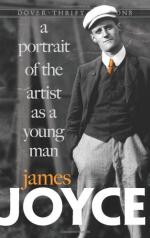A film still veiled his eyes but they burned no longer. A power, akin to that which had often made anger or resentment fall from him, brought his steps to rest. He stood still and gazed up at the sombre porch of the morgue and from that to the dark cobbled laneway at its side. He saw the word Lotts on the wall of the lane and breathed slowly the rank heavy air.
That is horse piss and rotted straw, he thought. It is a good odour to breathe. It will calm my heart. My heart is quite calm now. I will go back.
* * * * *
Stephen was once again seated beside his father in the corner of a railway carriage at Kingsbridge. He was travelling with his father by the night mail to Cork. As the train steamed out of the station he recalled his childish wonder of years before and every event of his first day at Clongowes. But he felt no wonder now. He saw the darkening lands slipping away past him, the silent telegraph-poles passing his window swiftly every four seconds, the little glimmering stations, manned by a few silent sentries, flung by the mail behind her and twinkling for a moment in the darkness like fiery grains flung backwards by a runner.
He listened without sympathy to his father’s evocation of Cork and of scenes of his youth, a tale broken by sighs or draughts from his pocket flask whenever the image of some dead friend appeared in it or whenever the evoker remembered suddenly the purpose of his actual visit. Stephen heard but could feel no pity. The images of the dead were all strangers to him save that of uncle Charles, an image which had lately been fading out of memory. He knew, however, that his father’s property was going to be sold by auction, and in the manner of his own dispossession he felt the world give the lie rudely to his phantasy.
At Maryborough he fell asleep. When he awoke the train had passed out of Mallow and his father was stretched asleep on the other seat. The cold light of the dawn lay over the country, over the unpeopled fields and the closed cottages. The terror of sleep fascinated his mind as he watched the silent country or heard from time to time his father’s deep breath or sudden sleepy movement. The neighbourhood of unseen sleepers filled him with strange dread, as though they could harm him, and he prayed that the day might come quickly. His prayer, addressed neither to God nor saint, began with a shiver, as the chilly morning breeze crept through the chink of the carriage door to his feet, and ended in a trail of foolish words which he made to fit the insistent rhythm of the train; and silently, at intervals of four seconds, the telegraph-poles held the galloping notes of the music between punctual bars. This furious music allayed his dread and, leaning against the windowledge, he let his eyelids close again.
They drove in a jingle across Cork while it was still early morning and Stephen finished his sleep in a bedroom of the Victoria Hotel. The bright warm sunlight was streaming through the window and he could hear the din of traffic. His father was standing before the dressing-table, examining his hair and face and moustache with great care, craning his neck across the water-jug and drawing it back sideways to see the better. While he did so he sang softly to himself with quaint accent and phrasing:




